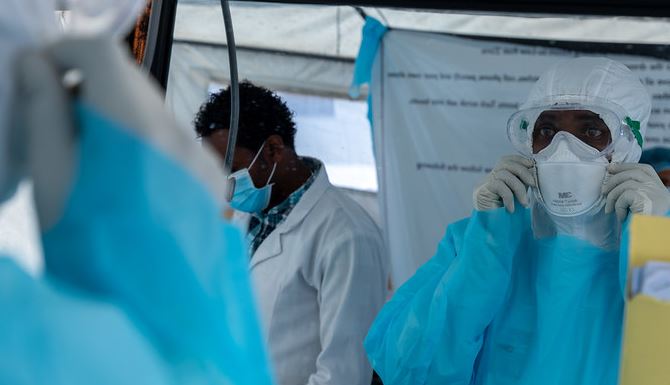Adaptive leadership in the COVID 19 leadership: Insights from Ethiopia
By: Arkebe Oqubay
The success of humanity and nations during times of crisis such as the complex, multi-dimensional Covid-19 pandemic is determined by leadership. At a time when the socio-economic foundations of society are being shaken, its leaders are required to provide exceptional leadership. Nonetheless, swift and bold decisions should be taken in the face of inadequate evidence, incomplete scientific advice and evolving uncertainty. Transformative and adaptive leadership is essential.
From converting public universities into quarantine centres to conducting house-to-house screenings of more than 11 million households, Ethiopia’s response to the Covid-19 pandemic can only be described as unconventional. The country did not introduce a national lockdown, the popular strategy followed by most governments. Instead, the government initiated bold and swift measures in January, scaling up coordinated national responses by mid-March when the first case was reported.
Ethiopia’s adaptive leadership so far has yielded positive outcomes. As of 25 May 2020, only 655 cases (PDF) had been reported, which is an occurrence rate of 0.5% among the tested population, 80% of whom (PDF) are between 24 and 44 years of age (PDF). Five deaths have been reported while the spread of the virus in communities (PDF) is reported to stand at 25%.
Ethiopia’s pathway is a work in progress. The country is still at the early stages of the pandemic and is likely to face a surge in the coming few months. Nevertheless, its unconventional approach illustrates four important aspects of adaptive and transformative leadership.
First and foremost, governments must note that this is more than a pandemic or public health emergency. While all decisions need to be based on the best available scientific evidence, they must nevertheless be made swiftly in uncertain times. Standard prescriptions will not work in this multi-dimensional crisis, which has long-term implications and requires not only local and national responses which take the unique context of each country into account, but also unified regional and international responses. Governments need to take strategic measures that reflect their countries’ individual characteristics while learning from others. This is perfectly illustrated through Ethiopia’s unconventional approach.
I have done three out of ten
The National Green Legacy Committee has visited Sodere Nursery in Oromia Region
The Ethiopian government has relied on community mobilisation and public awareness campaigns – including regular public announcements made by the prime minister and health minster – which have proved to be effective and cost efficient. It has also relied on its existing primary public (PDF) healthcare infrastructure and health extension system, with more than 75% of healthcare professionals working in 21,000 health posts and health centers.
Moreover, for the last two decades, Ethiopia’s health system has been prevention based. This investment has paid off. The government has made full use of its public infrastructure and publicly owned enterprises (such as railways and air transport) as a vehicle for positive interventions. While building on strengths is important, Covid-19 is an opportunity to strengthen resilience and thrive on new opportunities. Ethiopian Airline’s response is a classic example of survival and resilience. After all, leadership is about building on your strengths.
There can be no success without collaboration. The Ethiopian government acted in a coherent way by maximising coordination among federal agencies, between federal, regional state and local levels, and also with opposition political parties and religious and community leaders. Following debate and consensus, national elections have even been postponed.
Moreover, by reaching out to suppliers and mobilising resources from donors and development partners, the government has been speaking with the private sector to come up with workable solutions to the economic impact of Covid-19. This collaboration on all levels will be a key driver of the outcomes.
Although lockdown was not implemented at the early stages of the pandemic, maximum precautions were put in place and these coherent efforts must be sustained. Support for firms was tied to performance and the need to protect exports. The government was also focused on supporting productive capacity and repurposing factories in industrial parks as major manufacturing and export hubs for Personal Protective Equipment, preventing dynamic gains from being wiped out.
However, the response to the crisis should not undermine post-crisis growth dynamics. There will be opportunities to upgrade the public healthcare system and for digital transformation in telemedicine, education, government services and businesses. Learning is a vital catalyst during this process.
However, the Ethiopian government has also been facing multiple challenges in dealing with the Covid-19 pandemic.
First, the country must boost the current low level of diagnostic testing and build on learning from best experiences elsewhere. There is a need for stricter social distancing measures, a wider use of face masks, and stronger community awareness campaigns. The cross-border control and compulsory quarantine must also be tightened, which has become a major concern.
Second, the Ethiopian government must take additional measures to reduce the economic impact of the pandemic and support the most vulnerable social groups, in particular. It must also strengthen its targeted support for the export sector.
Finally, the government and political parties must adhere to the constitution and ensure a fair and free national election is conducted, which was set to take place in August of this year. Ethiopia is still in the early stages of the pandemic and an adjustment of responses may be required.
Ethiopia’s evolving Covid-19 situation is at the tip of the iceberg and it may not be possible to predict the outcomes when Ethiopia and other African countries enter the ‘surge’ stage of the crisis. However, one lesson is very clear. Outcomes will be shaped by adaptive and transformative leadership, and like all arts these can be enhanced through learning and practice.
Arkebe Oqubay is a Senior Minister and Special Adviser to the Prime Minister of Ethiopia.

